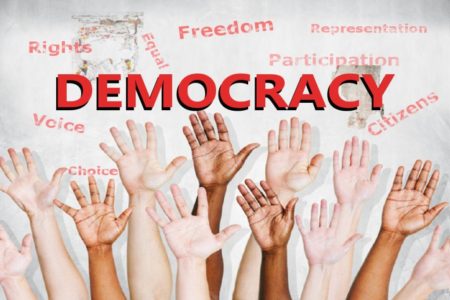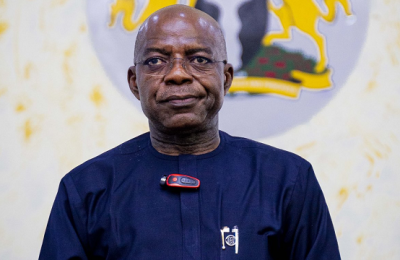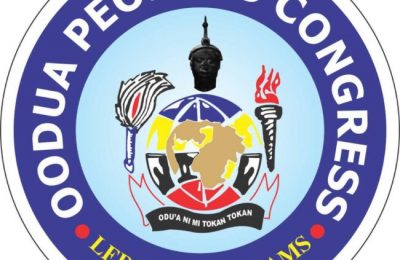
Nigeria will record a milestone in its democratic journey on May 29, as it marks 25 years of uninterrupted democracy – the longest since independence in 1960. While the First Republic lasted for six years, and the Second Republic for four years, the Third Republic was aborted as the Presidential election was annulled.
As expected, to mark the occasion, drums would be rolled out and dividends of democracy would be reeled out by governments at all levels.

But beyond this are salient questions: Is Nigeria working? If not, what system of government will make Nigeria work?
On the first question, many would agree that Nigeria is far from where it ought to be in terms of growth and development despite its enormous potentials. At independence, Nigeria, a country blessed with huge human and natural resources, showed promise of a great nation. Apart from solid, liquid, gaseous minerals buried in the ground, the palm oil, rubber, cocoa, timber and the groundnut pyramids, all pointed to the fact that the prospects were great. 64 years after, these great expectations are yet to be met as Nigeria is still battling to resolve some of its teething problems.
On the salient question on whether the presidential system of government is working for Nigeria, there is a unanimity of opinion that the system is not working and its imperfections have slowed the pace of Nigeria’s development strides. From the huge cost of governance associated with the presidential system, its slow decision making and implementation pace, and the tendency for the emergence of an all-powerful leader who is neither accountable to the people nor their representatives in the legislature, to the inability to change a bad leader until the next election cycle or through a rigorous removal process, the inherent defects of the presidential system are obvious.
Taking cognizance of Nigeria’s chequered history of governance, 60 members of the House of Representatives (well over 60 now) introduced three bills mid-February seeking the alteration of the Constitution for a transition to Parliamentary System.
It’s a great privilege for me to be among the sponsors of the bills, comprising lawmakers across party lines and geopolitical zones. We are motivated by our patriotic desires to make Nigeria work for its people and reclaim its glorious destiny as the Giant of Africa and the pride of the black race.
We are of the strong view that the best time to hold a national conversation on the system of government that works for Nigeria is now. Gladly, the national conversation has been ignited.
Conversations are on going on which system works for Nigeria. We have held consultations with some leaders of thought, former presidents, traditional rulers, and elder statesmen across geopolitical zones. In all the conversations held so far, there is unanimity of opinions that the current system is defective and there is a need to evolve a system that will work for Nigeria. There is also a consensus that such a system must take cognizance of our peculiarity in terms of history, culture and values.
There are basically three forms of democratic government systems around the world – Presidential, Parliamentary, and the hybrid system, which contains features of both presidential and parliamentary system. Data has however shown that there are more parliamentary forms of government.
In initiating the bills, we recalled that our founders in their wisdom and in a political atmosphere devoid of compulsion, having considered the interests of their native peoples and their desire to live together in a country where truth and justice reign, where no man is oppressed, and where all citizens live in peace and plenty, adopted the parliamentary System of Government.
The system lasted till the First Republic was truncated by military coup, following political unrests of the 1960s. The system worked while it lasted, but the six years duration were too short. The collapse of the First Republic led to military rule which lasted for 14 years. The political transition programme of the 1970s midwifed by the military regime introduced the presidential system of government of the American model. The political transition programme culminated in the birth of the Second Republic, which lasted for four years.
The collapse of the Second Republic began another epoch of military rule which lasted for 15 years, during which a prolonged transition programme within the first 10 years ended in an aborted Third Republic, an interim government of an appointed civilian leader, and another military era that culminated in the birth of the Fourth Republic in 1999.
25 years of the current democratic dispensation have however shown the shortcomings of the presidential system of government, which include huge cost of governance; excessively powerful presidency wielding fierce influence on the legislature and posing threats to the independence of the judiciary; slow pace of policy formation and implementation; nearly impossible process of removing a bad leader before scheduled elections due to the very rigorous impeachment process; and the fact that cabinet in a presidential system is neither accountable to the people nor to their representatives in parliament, thereby making government less responsive to the resolutions of the legislature and yearnings of the people.
Why a home-grown parliamentary system? Firstly, that was the system adopted by our founders, who were consummate nationalists, unhindered in their political thoughts, fearless in the protection of the value system of their various peoples and desirous of building a strong and vibrant nation that meets the aspirations of its citizens. What we are however advocating is a home-grown system that reflects our peculiarities.
Secondly, parliamentary system is more effective and efficient because it is not inhibited by checks and balances, which sometimes lead to debilitating gridlocks. That was witnessed extensively in the government of President Olusegun Obasanjo when the legislature and the executive were at loggerheads for most part of the administration on policy direction and budgetary approvals. In parliamentary system, because the members of cabinet are chosen from the legislature, there is better coordination between the two arms, therefore making it easier to pass laws and implement them.
Thirdly, the head of government and the cabinet are responsible and responsive because they are accountable to the parliament comprising the representatives of the people. Example of this accountability to the legislature is the prime minister’s questions in nations practising parliamentary system, during which the prime minister answers questions from members of parliament at a specific day of the week.
Fourthly, the flexibility associated with the parliamentary system such that the Prime Minister can be removed with a vote of no confidence or a call for early elections, which is more or less a referendum on the government. This helps to guarantee a responsible and responsive government, and prevents the concentration of power in one hand and authoritarianism, unlike the presidential system where such removal can only be through a rigorous impeachment process or in polls held at constitutionally fixed election cycle.
Another reason for the endorsement of the parliamentary system is the huge costs associated with the presidential system. For example, an enormous sum of over N300 billion was spent by INEC on the 2023 elections, which included Presidential, National Assembly, Governorship and State Assembly elections. The burden of election costs is not limited to government alone. Candidates and political parties also incur enormous electioneering costs because of the series and scope of elections. In a parliamentary system, nationwide presidential election and state-wide governorship elections are not required because members of parliaments are elected in their various constituencies, and they in turn elect the heads of federal government and the state governments in their respective parliaments, thereby eliminating election costs for that purpose.
The past 25 years have shown that a major imperfection of the presidential system is the high cost of governance, particularly in the area of personnel costs of political appointees, leaving fewer resources for other critical sectors. Whereas in parliamentary system, the cabinet is picked from the members of the legislature, thereby knocking off additional personnel costs.
One of our intentions is to provoke a national discourse on the governance system suitable for Nigeria. Apart from the consultations held so far, there are plans to consult CSOs, religious leaders, business community and of course the youths. As part of the effective engagement of the youths, the Parliamentary Systems Support group (PSSG) has kicked off a national essay competition open globally to all Nigerian students at any university to discuss the system of government that works for the country.
In the present democratic dispensation, two national conferences had been held – One under President Obasanjo government and the other under President Goodluck Jonathan. These conferences confirm that Nigerians believe that the system was not working and there was need to find suitable alternatives. Sadly, the factors that compelled the convocation of the conferences are still on ground.
As the national conversation continues, it is not unexpected that the outcome may be a hybrid government system that combines the lessons of our history, the beauty of our culture and the sacrosanctity of our values. May this conversation culminate in the adoption a home-grown government system that works for Nigeria.
*Hon. Abdussamad Dasuki, House of Representatives member representing Kebbe/Tambuwal Federal Constituency of Sokoto State, is the spokesman of the lawmakers calling for return to home-grown parliamentary system.







